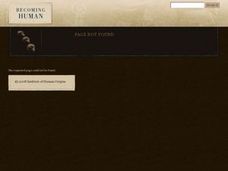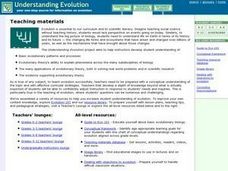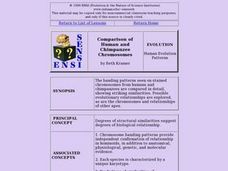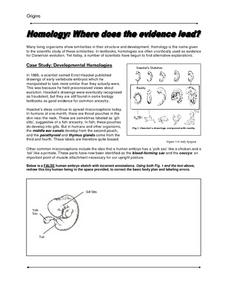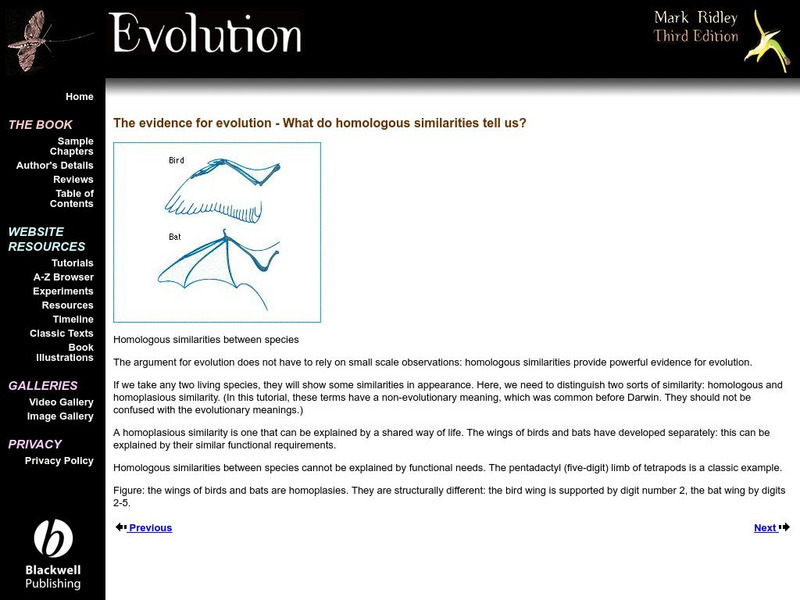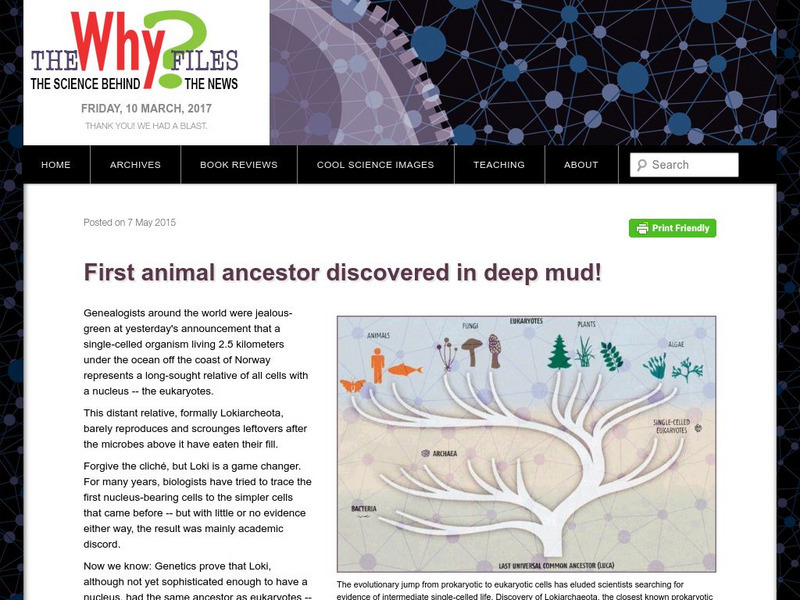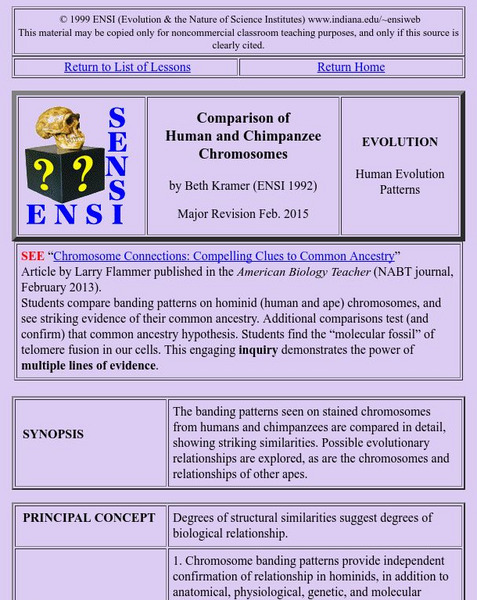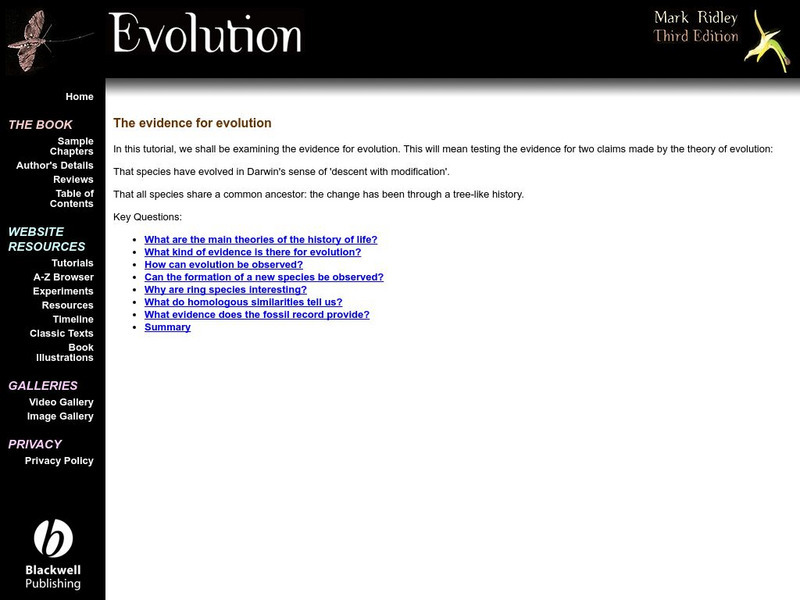Curated OER
Building Bodies
Students identify key anatomical similarities and differences between great apes and humans. They infer likely anatomical features in ancient human ancestors and list principal anatomical changes in primates necessary for adaptation to...
Howard Hughes Medical Institute
Vertebrate Circulatorium
When you get to the heart of the matter, you learn a lot about an organism by studying its circulatory system! A perfect resource for a zoology or anatomy class, the simulation gives users a peek inside a variety of vertebrates to...
Curated OER
Making Cladograms
Students construct cladograms (evolutionary trees), showing how shared derived characters can be used to reveal degrees of relationship. They interpret and analyze cladograms, and determine where unclassified vertebrates would fit on a...
Howard Hughes Medical Institute
Stalking the Genetic Basis of a Trait
Need an a-maize-ing lesson to show your class how regulatory genes work? If you use the well-written resource, they'll be all ears! Biology scholars discover the gene responsible for the evolution of the modern-day corn plant through a...
Curated OER
Comparison of Human and Chimpanzee Chromosomes
Students actively engage in the careful analysis of chromosome banding patterns and identify examples of inversion in homologous chromosomes.
Curated OER
The Earliest Primates
In this early primate worksheet, students will read information about the fossil evidence of the earliest primates. Students will complete 3 short answer questions based on their reading.
Curated OER
From Wolf to Dog
Students explain how dogs evolved from wolves based on the video. In this biology lesson, students research about breeding animals for specific traits. They interview dog owners and create a presentation about the dog.
Curated OER
Why Do We Need Vitamin C in Our Diet?
Students compare/contrast the DNA sequence data of the rat GULO gene to the inactive human GULO gene. They translate and align the sequences, and propose a scenario to explain the occurrence of an inactive DNA sequence to that of an...
Curated OER
Primate Characteristics and Exaptation
Students compare the features of gorilla to humans. In this biology lesson, students simulate adaptation using materials found in the classroom. They explain what exaptation means.
Curated OER
Fun with Phylogenetic Trees
Tenth graders differentiate angiosperms and gymnosperms. In this biology lesson, 10th graders construct a musical phylogenetic tree from information they gathered on resource websites. They present their project in class.
McGraw Hill
Arthropods
Are spiders related to crabs? Study the order of arthropods with a reading selection about animal diversity. It provides details about each class within the order, as well as vivid pictures and explanatory charts.
Curated OER
Hominoid Cranium Comparison
Students describe, measure and compare cranial casts from contemporary apes (chimpanzees and gorillas, typically), modern humans and fossil "hominids" (erect and bipedal forms evolutionarily separated from apes).
Curated OER
Chromosome Fusion
Students see how patterns can reveal events of the past, thereby merging elements of both experimental and historical science.
Curated OER
Homology: Where Does The Evidence Lead
High schoolers are introduced to the topic of homology. In groups, they read a case study and compare different drawings of early vertebrate emryos. They work together to answer discussion questions and label the various parts of each...
Curated OER
Biology Chapter 15 Word Search Puzzle
In this biology worksheet, students look for the words that are related to the theme of the worksheet. They also work on the skills of spelling and word recognition.
Other
The Evidence for Evolution: Homologous Similarities
This site is a section part of a website that accompanies "Evolution," a textbook by Mark Ridley. Here he covers homologous structures, using them as evidence for evolution.
University of Wisconsin
The Why Files: First Animal Ancestor Discovered in Deep Mud
Two billion years ago, we share a common ancestor with this new-found relative. Is this our origin?
Other
Evidence for Evolution: Genetic Code
These pages are part of a site called Evolution that accompany a textbook by the same name. Mark Ridley is the author. In this section: the universal genetic code provides evidence that life has a common ancestor.
Mocomi & Anibrain Digital Technologies
Mocomi: The Theory of Evolution
This slideshow provides a brief overview of Charles Darwin and his theory of evolution, natural selection and survival of the fittest.
University of California
Understanding Evolution: The Big Issues
Visit some of the biggest questions that scientists try to answer about evolution.
Indiana University
Ensi: Comparison of Human: Chimpanzee Chromosomes Lesson
This is a great lesson plan that combines Karoytypes and evolution. Learners will recognize that the chromosomes of chimpanzees and humans are remarkably similar, then correlate that to their evolutionary relationship.
Cold Spring Harbor Laboratory
Dna From the Beginning: Living Things Share Common Genes
This multimedia article includes animations, pictures, video, biographical information, and quiz questions that are accessed by clicking on buttons along the bottom of the page. Here you can see how common genes are evidence for common...
Other
Evolution: Evidence From Living Organisms
By examining fossils, scientists have collected evidence that supports the theory that species changed over time. As you read this article, study this evidence and critically evaluate whether it indicates that species may have arisen by...
Other
The Evidence for Evolution
These pages are part of a site called "Evolution," that accompanies a textbook by the same name. Mark Ridley is the author, and in this section he discusses the evidence for evolution.


